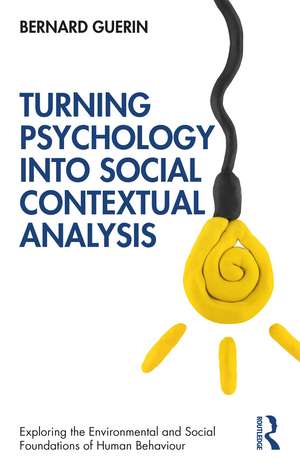Turning Psychology into Social Contextual Analysis: Exploring the Environmental and Social Foundations of Human Behaviour
Autor Bernard Guerinen Limba Engleză Paperback – 20 iul 2020
of people by merging psychology with the social sciences. It is part of a
trilogy that offers a new way of doing psychology focusing on people’s
social and societal environments as determining their behaviour, rather than
internal and individualistic attributions.
Putting the ‘social’ properly back into psychology, Bernard Guerin turns
psychology inside out to offer a more integrated way of thinking about and
researching people. Going back 60 years of psychology’s history to the
‘cognitive revolution’, Guerin argues that psychology made a mistake, and
demonstrates in fascinating new ways how to instead fully contextualize the
topics of psychology and merge with the social sciences. Covering perception,
emotion, language, thinking, and social behaviour, the book seeks to
guide readers to observe how behaviours are shaped by their social, cultural,
economic, patriarchal, colonized, historical, and other contexts. Our brain,
neurophysiology, and body are still involved as important interfaces, but
human actions do not originate inside of people so we will never fi nd the
answers in our neurophysiology. Replacing the internal origins of behaviour
with external social contextual analyses, the book even argues that thinking
is not done by you ‘in your head’ but arises from our external social, cultural,
and discursive worlds.
Offering a refreshing new approach to better understand how humans
operate in their social, cultural, economic, discursive, and societal worlds,
rather than inside their heads, and how we might have to rethink our
approaches to neuropsychology as well, this is fascinating reading for
students in psychology and the social sciences.
| Toate formatele și edițiile | Preț | Express |
|---|---|---|
| Paperback (1) | 274.82 lei 6-8 săpt. | |
| Taylor & Francis – 20 iul 2020 | 274.82 lei 6-8 săpt. | |
| Hardback (1) | 995.58 lei 6-8 săpt. | |
| Taylor & Francis – 20 iul 2020 | 995.58 lei 6-8 săpt. |
Preț: 274.82 lei
Nou
Puncte Express: 412
Preț estimativ în valută:
52.60€ • 57.16$ • 44.22£
52.60€ • 57.16$ • 44.22£
Carte tipărită la comandă
Livrare economică 21 aprilie-05 mai
Preluare comenzi: 021 569.72.76
Specificații
ISBN-13: 9780367898113
ISBN-10: 036789811X
Pagini: 174
Ilustrații: 18
Dimensiuni: 138 x 216 x 13 mm
Greutate: 0.22 kg
Ediția:1
Editura: Taylor & Francis
Colecția Routledge
Seria Exploring the Environmental and Social Foundations of Human Behaviour
Locul publicării:Oxford, United Kingdom
ISBN-10: 036789811X
Pagini: 174
Ilustrații: 18
Dimensiuni: 138 x 216 x 13 mm
Greutate: 0.22 kg
Ediția:1
Editura: Taylor & Francis
Colecția Routledge
Seria Exploring the Environmental and Social Foundations of Human Behaviour
Locul publicării:Oxford, United Kingdom
Public țintă
General, Postgraduate, Professional, and Undergraduate AdvancedCuprins
1. Where psychology went wrong 60 years ago: An erroneous turn at the fork in the Gestalt road 2. Going back to the ‘fork in the road’ and starting a fresh contextual approach 3. "Language is a socially transitive verb": Huh? 4. How can thinking possibly originate in our environments? 5. Contextualizing perception: Continuous micro responses focus-engaging with the changing effects of fractal-like environments? 6. Contextualizing emotions: When words fail us 7. The perils of using language in everyday life: The dark side of discourse and thinking 8. Weaning yourself off cognitive models
Notă biografică
Bernard Guerin has worked in both Australia and New Zealand researching and teaching to merge psychology with the social sciences. His main research now focuses on contextualizing ‘mental health’ behaviours, working with Indigenous communities, and exploring social contextual analyses especially for language use and thinking.
Descriere
This book puts the ‘social’ back into social psychology and offers a more integrated way of thinking about and researching people and intervening to change what people do. It is part of a trilogy that offers a new way of doing psychology focusing on people’s social environments as determining their behaviour, rather than internal attributions.









